|
|
|
Sort Order |
|
|
|
Items / Page
|
|
|
|
|
|
|
| Srl | Item |
| 1 |
ID:
146344
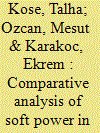

|
|
|
|
|
| Summary/Abstract |
This study explores the relationship between ethnic, sectarian, and religious identities and soft power in the Middle East and North Africa (MENA) region in the immediate aftermath of the Arab Uprisings. Utilizing original public opinion surveys conducted in Egypt and Iraq in 2012, we find that identity-based allegiances play a major role in groups’ choices regarding which countries’ increasing involvement in the region are seen favorably and which countries are seen as an ideal model for the region. Sunnis are likely to view Turkey and Saudi Arabia positively in both regards, whereas Shiites are more supportive of Iran. But our results also suggest that crosscutting cleavages should not be overlooked: Sunni Kurds are less likely to hold positive attitudes toward Turkey and Saudi Arabia. Our findings also show that Copts, a religious minority in Egypt, hold positive attitudes toward the United States and negative ones toward Saudi Arabia and Iran. These findings contribute to both the theoretical literature on soft power and the debates on international competition for influence in the MENA region by emphasizing the role of ethnic and religious identities in shaping attitudes toward international actors.
|
|
|
|
|
|
|
|
|
|
|
|
|
|
|
|
| 2 |
ID:
145578


|
|
|
| 3 |
ID:
176782


|
|
|
|
|
| Summary/Abstract |
The energy policy of The Visegrad Group states (V4: Poland, Czechia, Slovakia and Hungary) is being challenged by, among many other factors, dependence on the import of energy resources, increasing environmental pressure, insufficient and disappointing process of energy policy Europeanisation. Therefore, all V4 states are seeking new energy policy solutions and directions, which is seen as a condition for both economic and political development. This paper provides a conceptualisation of the geopolitical dimensions of energy policy strategy, empirically focusing on its Southern direction. Firstly, it aims to identify and analyse the key areas of strategic thinking about energy security in the Visegrad states. Secondly, it attempts to answer the question of place and importance of the Southern Dimension (SD) in V4 energy policy strategies. In other words, it investigates whether the V4 states energy security can be improved by deepening energy cooperation with partners from southern regions, in particular with the MENA region. The hypothesis to be verified by this study states that the more hawkish V4 states’ energy security strategies are, the greater their preference for the liberalisation of the international energy market. The article follows the qualitative approach and relies on the case study methodology.
|
|
|
|
|
|
|
|
|
|
|
|
|
|
|
|
| 4 |
ID:
163239
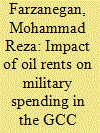

|
|
|
|
|
| Summary/Abstract |
This study shows how the level of corruption matters in the way oil rents affect a state's military spending. Using panel data covering the 1984–2014 period for the Gulf Cooperation Countries (GCC), we find that the effect of oil rents on military budgets depends on the extent of political corruption. Oil rents are negatively associated with military spending of the GCC countries. However this, in turn, is moderated by higher levels of corruption. For comparison, we examine this association in non-GCC countries in the MENA region, finding a positive effect of higher oil rents on military spending: this effect is larger in corrupt polities within non-GCC countries. The intermediary role of corruption in the military-oil nexus is robust, controlling for a set of variables that may affect military spending.
|
|
|
|
|
|
|
|
|
|
|
|
|
|
|
|
| 5 |
ID:
102906
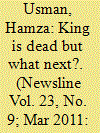

|
|
|
| 6 |
ID:
137405


|
|
|
| 7 |
ID:
188645
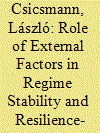

|
|
|
|
|
| Summary/Abstract |
This article aims to bring together the factors of resilience, regime stability, and foreign penetration into one research project based on the example of the Hashemite Kingdom of Jordan, which marked the one-hundredth anniversary of its statehood in 2021. Even though it exists in a neighborhood that is in turmoil, the Jordanian monarchy has managed to survive all the spillover effects from such regional conflicts. This study argues that external influences have played an increasingly significant role in political developments in Jordan since the beginning of the New World Order in 1989. Scholars of international relations often argue that foreign penetration may cause state vacuums like those that have arisen in Syria, Libya, Yemen, and Iraq. Yet, this has not been the case with other states in the Middle East. One important factor behind this resilience and regime stability is related to the behavior of foreign actors. With respect to the Hashemite Kingdom, the United States has historically been the main provider of state security. Nonetheless, at the same time the European Union (EU) has adopted a pragmatic view toward Jordan and its new resilience-building approach also helps to maintain the status quo. Moreover, the regional hegemons and swing states of the Middle East and North Africa (MENA) region do not have an interest in altering the existing order save for a few radical groups. The author argues that the convergence of the national interests of the major regional stakeholders also contributes to regime stability and that outside support has increased the resilience of its political system despite the growing frustrations of many of the country’s citizens.
|
|
|
|
|
|
|
|
|
|
|
|
|
|
|
|
| 8 |
ID:
184232
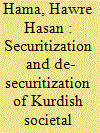

|
|
|
|
|
| Summary/Abstract |
The four countries hosting Kurdish populations in the Middle East have mainly been politically centralized in character and sought to follow a homogeneous nation-state model through the assimilation of their Kurdish communities. Drawing on the concepts of societal security, securitization, and de-securitization derived from the theories of the Copenhagen School, this article examines Kurdish (in)security in the Middle East and argues that the Kurds have experienced significant societal insecurity due to the adoption of assimilation strategies by their host states. I posit that federalism and power sharing are the two obvious de-securitization strategies that may address the securitization of Kurdish identity in the states with significant Kurdish populations. I further argue that, while the federal model has appeared to manage securitized Kurdish identity in Iraq since 2003, this solution may not be applicable to Turkey, Iran, and Syria. Alternatively, consociational power sharing as a form of institutional de-securitization carries the potential to address Kurdish identity in these countries.
|
|
|
|
|
|
|
|
|
|
|
|
|
|
|
|
| 9 |
ID:
156853


|
|
|
|
|
| Summary/Abstract |
To this day, Tunisia remains the only country in the MENA region that has undergone a democratic transition following the popular uprisings of 2010–11. Yet the transition has proven difficult. The young democracy remains plagued by a number of challenges, some of which stem from the legacy of the Ben Ali era and others that have emerged during the transition. Against this backdrop, the country has been confronted with the resurgence of Salafi currents, as well as with the phenomenon of jihadist radicalization. Today, Tunisia is, per capita and in absolute numbers, one of the biggest exporters of jihadist foreign fighters in the world. Fatalities in Tunisia from jihadist violence have skyrocketed since the uprising, with attacks in 2015 on the Bardo Museum in Tunis and on a resort in Sousse having captured international attention. These trends not only pose a threat to the stability of the country, they also fuel and prolong conflicts in the wider region, ultimately also posing a threat to Europe and the wider West.
|
|
|
|
|
|
|
|
|
|
|
|
|
|
|
|
|
|
|
|
|